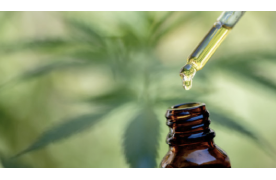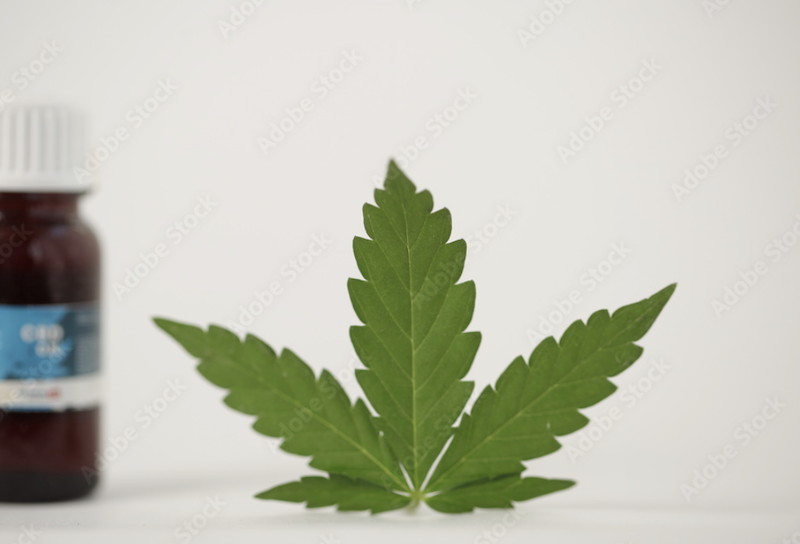THCA has become a focal point of interest in U.S. cannabis circles and smoke shops, igniting conversations and interest. Its allure rests on its unique attributes and legal standing.
Diverging from the typical application of distillates on flowers, THCA takes a distinct approach. Leveraging genetic engineering, farmers have developed a hemp strain rich in THCA, legally available throughout the country.
Remarkably, upon activation by heat, this hemp flower converts THCA into THC while complying with national legal regulations.
Tetrahydrocannabinolic acid plays an essential role as the first compound in the sequence of cannabinoid synthesis within the cannabis plant. As the plant matures through different growth stages, its buds undergo development, producing terpenes and an array of cannabinoids.
This process begins with CBGA, identified as the foundational cannabinoid, which later transforms into primary cannabinoids such as THCA and CBDA.
THCA, in its original state, lacks the capability to produce intoxicating effects. This unique attribute is attributed to its molecular arrangement, which includes an additional carboxyl ring. This specific structure inhibits its interaction with brain receptors responsible for eliciting a psychoactive response.
The pivotal function of THCA lies in its role as the precursor to THC, a well-known cannabinoid recognized for its diverse health advantages. The presence of THCA within cannabis buds or flowers is primarily noticeable in the pistils and trichomes, especially as the plant approaches its harvest, prominently observed in meticulously controlled indoor cultivation environments.
However, the industry often grapples with differentiating THCA from THC, particularly when subjecting THCA to heat, like in processes such as smoking, vaping, or dabbing, causing THCA to convert into THC, a highly favored psychoactive cannabinoid within cannabis communities.
Unveiling the Benefits of THCA
Tetrahydrocannabinolic acid, the non-psychoactive precursor to THC found in cannabis, showcases promising potential in various health arenas. Research suggests its possible neuroprotective properties, offering hope in potentially slowing or preventing the progression of neurodegenerative conditions such as Huntington’s disease. Moreover, THCA exhibits potential in addressing gastrointestinal issues like colitis and Irritable Bowel Syndrome (IBS), potentially easing associated symptoms.
Notably, even without the psychoactive effects typical of THC, THCA purportedly offers several health benefits:
- THCA’s anti-inflammatory properties may assist with conditions like arthritis and lupus by mitigating inflammation.
- Research implies that THCA could provide protection against neurodegenerative ailments like Parkinson’s and Alzheimer’s.
- THCA may have the potential to alleviate nausea and vomiting, beneficial for individuals undergoing treatments like chemotherapy.
- Potential in Fighting Cancer: Early studies hint at THCA’s ability to combat the growth of cancer cells, although further research is necessary in this realm.
- THCA might act as a pain reliever, particularly in chronic pain conditions.
- Studies suggest THCA could potentially inhibit the proliferation of cancer cells.
- THCA has shown potential in reducing muscle spasms, which can be helpful for conditions like multiple sclerosis.
Understanding THCA’s Psychoactive Nature
THCA naturally lacks the ability to induce intoxication. This distinctive feature stems from its molecular structure, where an additional carboxyl ring prevents it from interacting with brain receptors that trigger psychoactive effects.
THCA Contrasted with Other Cannabinoids
| Cannabinoid | Psychoactive | Primary Effects | Legality | Common Uses |
| THCA | No | Non-intoxicating, Potential anti-inflammatory | Varies by region, often legal | Medical applications, anti-inflammatory |
| Delta-8 | Yes | Milder psychoactive effects, relaxation | Varies by region, often in a legal grey area | Recreational, mild relaxation, medical |
| HHC | Yes | Similar to Delta-9, less potent | Varies by region, legal status unclear | Recreational, medical |
| THCP | Yes | Stronger than Delta-9, potent psychoactive effects | Varies by region, often in a legal grey area | Recreational, potent effects |
| Delta-10 | Yes | Milder than Delta-9, focus and creativity | Varies by region, often in a legal grey area | Recreational, creativity and focus |
| Delta-9 | Yes | Psychoactive, euphoria | Varies by region, often illegal | Recreational, medical, euphoric effects |
THCA and Drug Screening
THCA has the potential to appear on a drug test according to research findings. While THCA lacks psychoactive properties and acts as a precursor to THC, standard drug tests usually cannot distinguish between different types of THC. These tests are specifically designed to identify the presence of THC or its metabolites (such as THC-COOH) within the body.
Comparison Between THC and THCA
The key distinction between THCA and THC revolves around their psychoactive effects; THCA does not trigger the intoxicating sensations associated with THC. The conversion of THCA into THC requires heat, which can be achieved through methods like smoking, vaping, dabbing, or cooking edibles. This conversion process alters THCA’s molecular structure by removing a carboxyl ring, allowing THC to interact with CB1 receptors in the body.
Regarding their effects, THCA and THC exhibit certain similarities. Both demonstrate effectiveness against nausea, with THCA displaying particular promise in reducing inflammation. However, due to its non-intoxicating nature, THCA may have a comparatively reduced efficacy in aiding sleep when compared to THC. Conversely, while THC is generally not recommended for seizure disorders, research indicates that THCA might hold potential in addressing such conditions.
Locating THCA Products
You can find THCA products in various local smoke shops, but it’s crucial to approach these items carefully and confirm their quality through third-party certifications. Following thorough online research and assessing different brands, Diamond CBD emerged as a noteworthy choice. Their product range encompasses various offerings, including THCA flower and a diverse selection of other cannabinoids.
Concluding Remarks on THCA
THCA, or tetrahydrocannabinolic acid, has gained considerable attention in the United States, especially within cannabis enthusiast circles. Unlike THC, THCA lacks psychoactive properties and doesn’t induce any sensations of being “high”. It naturally exists in raw cannabis and transforms into THC when exposed to heat, such as through smoking or baking.
Renowned for its potential health benefits like anti-inflammatory and neuroprotective effects, THCA is being explored for its possible role in managing conditions like nausea and muscle spasms. However, despite its non-intoxicating nature, THCA may yield positive results on drug tests due to its conversion into THC. When seeking THCA products, ensure their quality through third-party testing, available at reputable smoke shops.




















